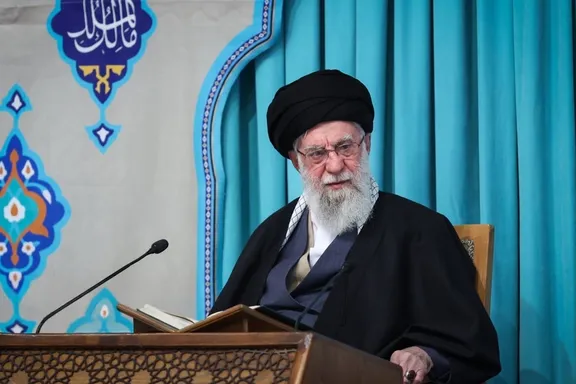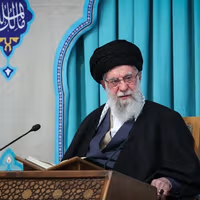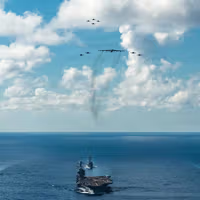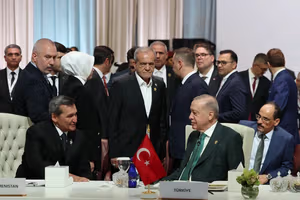On October 1, the Turkish president froze the assets of the Atomic Energy Organization of Iran, Bank Sepah and several firms involved in nuclear fuel production and uranium conversion, moving in lockstep with the latest UN sanctions against Tehran.
Erdogan's order revived provisions of earlier UN Security Council resolutions that had been put on hold after the 2015 nuclear agreement with Tehran.
However, the Atomic Energy Organization of Iran (AEOI) rejected reports that its assets had been frozen in Turkey.
Iranian media also said that several blacklisted bodies—including Bank Sepah and the AEOI itself—have no operations in Turkey, limiting the practical effect of the order.
Still, the move was significant: so far, the E3 (France, Britain and Germany), the European Union, the United States, Japan, Australia, New Zealand, and now Turkey have announced compliance with the reinstated UN sanctions.
The United States welcomed Ankara’s step, while Russia and China dismissed the measures as “null and void.”
Iran's friend or foe?
Iranian media and political commentators reacted with sharp criticism.
“Turkey’s early alignment with anti-Iran sanctions resolutions and its symbolic recognition of them is objectionable,” the conservative daily Farhikhtegan wrote in an editorial titled “The Realities of Turkey’s Sanctions Against Iran".
Conservative commentator and former Javan editor-in-chief Abdollah Ganji expressed disbelief on X: “Apparently, Turkey has taken the lead in the snapback… it has outpaced the Westerners. It's unbelievable. 18 companies? By Erdogan's decree? Is this true? What is the opinion of the Ministry of Foreign Affairs?”
Ehsan Movahedian, another conservative analyst, told state TV: “While Russia and China have not joined anti-Iran sanctions and Pakistan seeks barter trade, Turkey has taken the lead. We must correctly identify our friends, enemies, and rivals, and act accordingly.”
Counterpoint: ‘only compliance with UN resolutions’
Not all commentary was condemnatory. Some argued Turkey’s action was more a matter of obligation than betrayal.
“Even if (Turkey) was an ally, it would still do so. So would Iran if it were in Turkey’s place,” journalist Reza Ghobeishawi wrote on X. “The problem is not with Turkey but in the mind and mistaken perceptions inside (Iran) that brought things to this point.”
Reza Nasri, an international affairs commentator, however, accused Erdogan of lacking courage to break with Western frameworks in post on X.
He argued that most states recognize that Iran's nuclear program poses no threat to international peace to be subjected to UN Charter's Chapter VII measures, so Turkey and other states have every legal justification not to comply.
“Only courage to stand by the law is required.”
Signal to the West?
Several Iranian outlets suggested Turkey’s decision was more about geopolitics than legality.
“These sanctions are mostly symbolic since many of the listed entities are not active in Turkey. Erdogan seems to be sending a message to Trump that he stands with the West,” Ali Heydari, a Turkey analyst at the IRGC-linked Tasnim News Agency, posted on X.
Shaya News argued: “At first glance, Ankara justifies the measure as compliance with international obligations and legal commitments toward the UN. But at a deeper level, the decision raises serious questions about neighborly relations, bilateral principles, and the extent of Turkey’s foreign policy independence under international pressure.”
Impact on Iran–Turkey relations
Iran’s Foreign Ministry has so far remained silent. But commentaries warn the move could hurt trust and trade between the two neighbors, particularly in energy and finance.
“This choice comes at the expense of sacrificing bilateral relations with Iran,” Shaya News wrote.
“The asset freeze not only casts a shadow over Iranian investors and businessmen’s trust in Turkey but could also deprive Turkey of the benefits of its thriving economic relations with its eastern neighbor.”
Farhikhtegan similarly warned that Tehran’s response should be “proportionate to Ankara’s alignment with the White House’s anti-Iran policies.” It added that Turkey’s status as a NATO member and US security ally cannot be ignored.
“Should Ankara move toward serious anti-Iran measures—whether sanctions or security-related—then Iran’s approach to Turkey must necessarily be recalibrated within a security framework,” the newspaper wrote.










